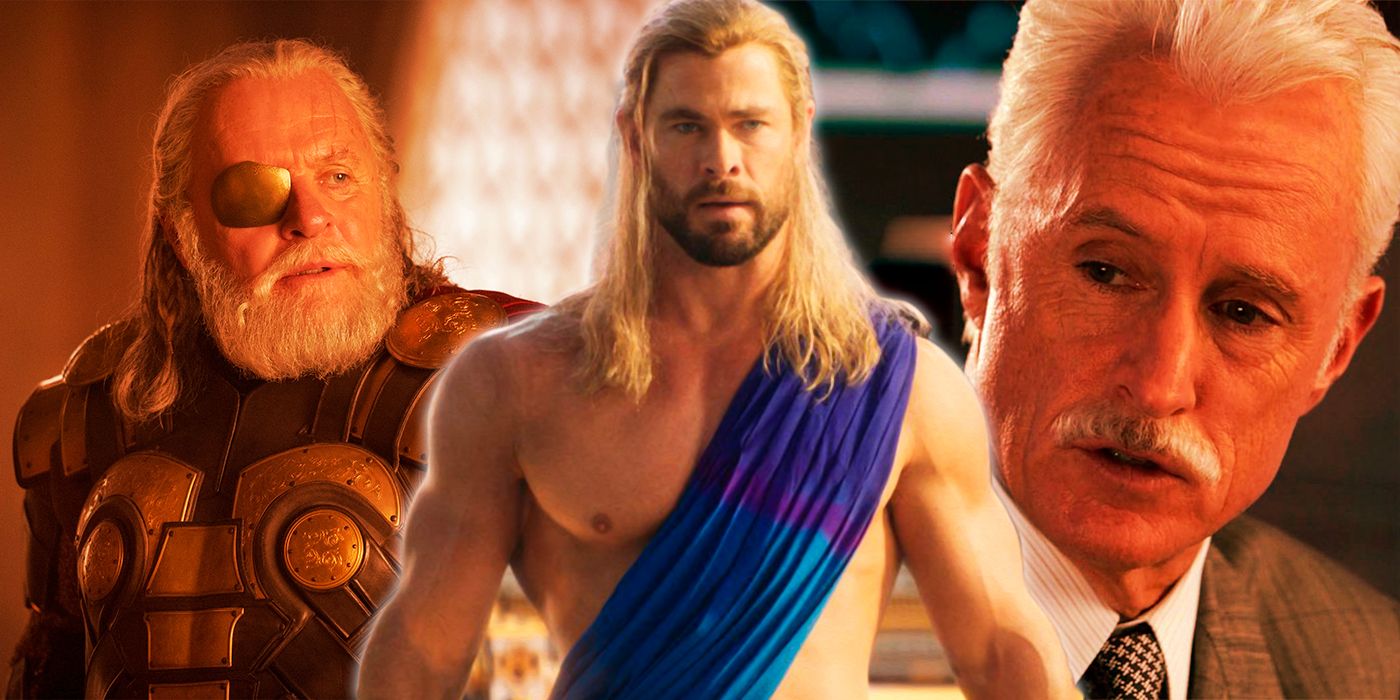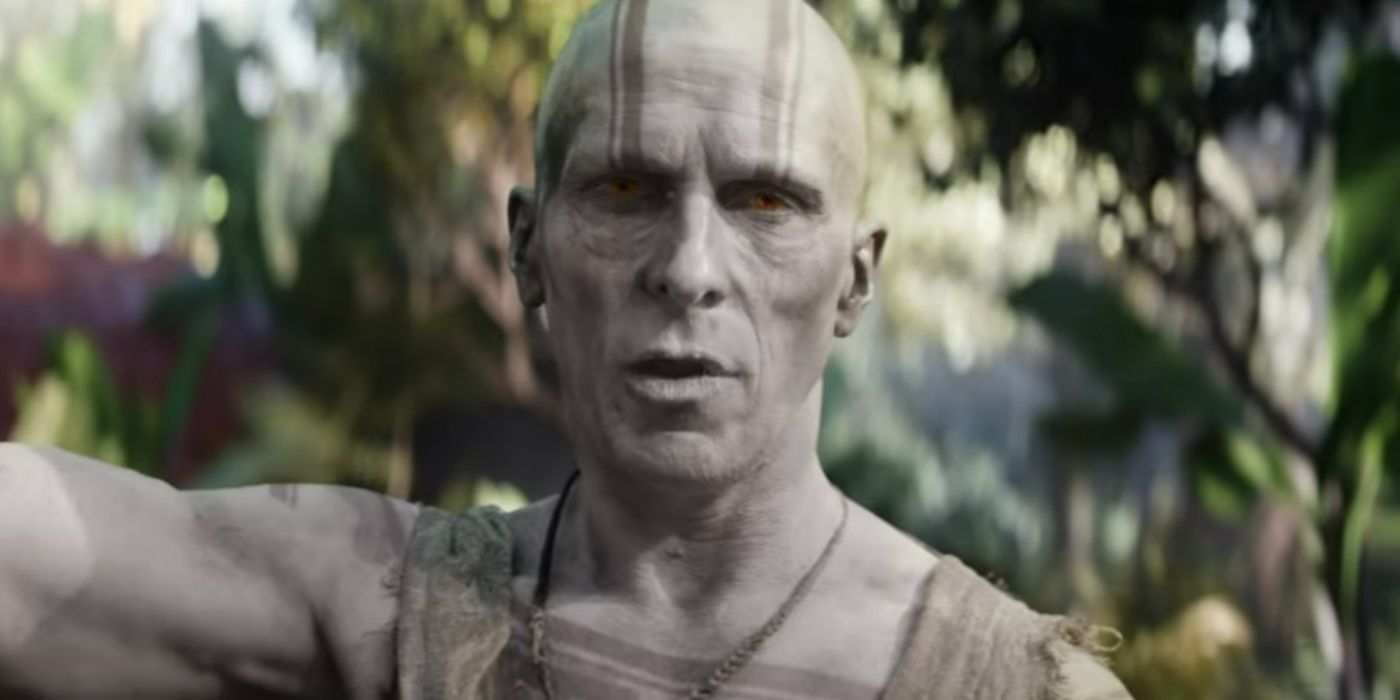The Marvel Cinematic Universe is not short on dead dads, with many of them being toxic or villainous. There is nothing wrong with having so many antagonistic fathers, especially since there are positive examples of fatherhood as well, like Ms. Marvel’s dad (Yusuf Khan), Ant-Man and Phastos. However, the issue lies in how many of these toxic fathers have been redeemed by their deaths or redeemed post-mortem, erasing the complexities of these relationships and minimizing the trauma these parents put their kids through. Come Thor: Love and Thunder, Gorr the God Butcher upends this trend.
Who Is Gorr, and What Happened to His Daughter?
In the new MCU film, audiences meet Gorr, a disciple of an uncaring god. Gorr’s people did everything they could to honor said god, with the hope they would be rewarded in the afterlife; however, this devotion lead to them suffering, with Gorr’s daughter, Love, dying. Even then, Gorr hoped she would be at peace in death, but when Gorr meets his god, he learns all of their suffering was for nothing. This shatters Gorr, and with the Necrosword’s influence, he kills his first god, deciding to murder every last god out of revenge.
There is no denying Gorr is the villain, but he is also an empathetic character, one that viewers may agree with since he is correct that many gods have hurt their believers more than they have helped. Furthermore, Gorr’s beliefs did lead to his daughter’s death, and while this was far from his intention, the damage was done.
What Is the MCU’s Problem With Redeeming Dead Dads?
With that in mind, his actions as a villain are not toward her, unlike the case of Shang-Chi and the Legend of the Ten Rings’ Wenwu. One of the most compelling villains of the MCU, Wenwu raises his children in a harmful situation; however, unlike Gorr, who seeks revenge after his daughter’s death, Wenwu trains Shang-Chi to use in his own revenge mission, returning to his warlord ways after his wife’s death. This causes trauma for Shang-Chi and his sister, Xialing, and Wenwu continues to hurt them into adulthood. There are many layers of Wenwu to unpack; however, by the climax of the film, Wenwu sacrifices himself for Shang-Chi, and Xialing and him are then left to accept this as his redemption, despite Wenwu never addressing what he’s done wrong and the film not examining how a death like this would resonate with the siblings.
Wenwu is not alone, as Yondu is another toxic father who justifies his abusive behavior as a means to protect his kid. Throughout Peter Quill’s childhood, Yondu puts him in dangerous situations and threatens his life. Not to mention, this relationship is built off of the fact Yondu kidnaped Quill. Even as an adult, Yondu is harsh toward Peter, but because he comes to save Peter at the end of The Guardians of the Galaxy Vol. 2, sacrificing himself in the process, this casts Yondu in a loving light.
The MCU dead dad problem extends even further to characters like Odin and Howard Stark, who are both terrible to their kids while not being villains. The lies and emotional manipulation Odin puts Loki through is horrific, but when it comes to his death, he does not acknowledge what he did wrong, simply saying that he loves both of his sons, as if that is enough.
Meanwhile, throughout the MCU, Tony has made a point that he has a lot of issues because of his father; however, it’s only in death that Tony gets closure from Howard, but this is not Howard owning up to his mistakes. The video message he leaves in Iron Man 2 is sweet, but it is made out of context in regard to what Tony goes through when he views it. Meanwhile, when Tony meets Howard in the past, they do have a heart-to-heart, but that doesn’t change any of Howard’s actions toward him. Plus, when Tony mentions how he now only remembers the good parts of his dad, it minimizes how harmful Howard’s behavior was toward him for most of his life.
Does Thor: Love and Thunder Redeem Gorr as a Father?
Gorr, on the other hand demands accountability for what happened to Love. He attempts to atone for how his god and beliefs played a part in her death by killing all the gods — holding himself and them accountable. While this is villainous and violent, it is coming from a place where he acknowledges that he complied with a system that hurt Love, something many of these other fathers have not done. On top of that, his actions as a villain are never toward her, unlike the aforementioned villains.
Furthermore, when it comes to his end goal, Gorr gives it up because he realizes there is another way to help Love, unlike Wenwu, who doesn’t relinquish his mission in favor of his children until it’s too late. Plus, unlike Wenwu and Yondu, who sacrifice their lives for their kids in order to save them, Gorr isn’t sacrificing his life to save Love; he is sacrificing his mission for a chance to bring her back.
This means Love can grow up without feeling like she owes her father the benefit of the doubt since he didn’t lose his life to save her; he lost his life because of his villainous ways. This way, Gorr is punished for his vile actions, but he is also seen as an empathetic father, one who takes accountability for his actions and actively tries to do right by his child, unlike Howard and Odin.
The aforementioned fathers are not bad characters, with Yondu and Wenwu in particular being stand-out flawed yet engaging antagonists; however, the problem lies in the MCU killing off these fathers and using their deaths as a way to redeem them. As for Odin and Howard, they didn’t die for their kids, but they’re actions are forgiven post-mortem despite these characters not actively trying to redeem themselves while alive. Death is the easy way out in regard to redemption, but, come Thor: Love and Thunder, Gorr shows there is a way to unpack the nuances of villainous fathers without using their deaths as a means to forgive them or ignore their past sins.
See how Gorr switches things up for villainous fathers in Thor: Love and Thunder, now in theaters.



-(1).jpg)